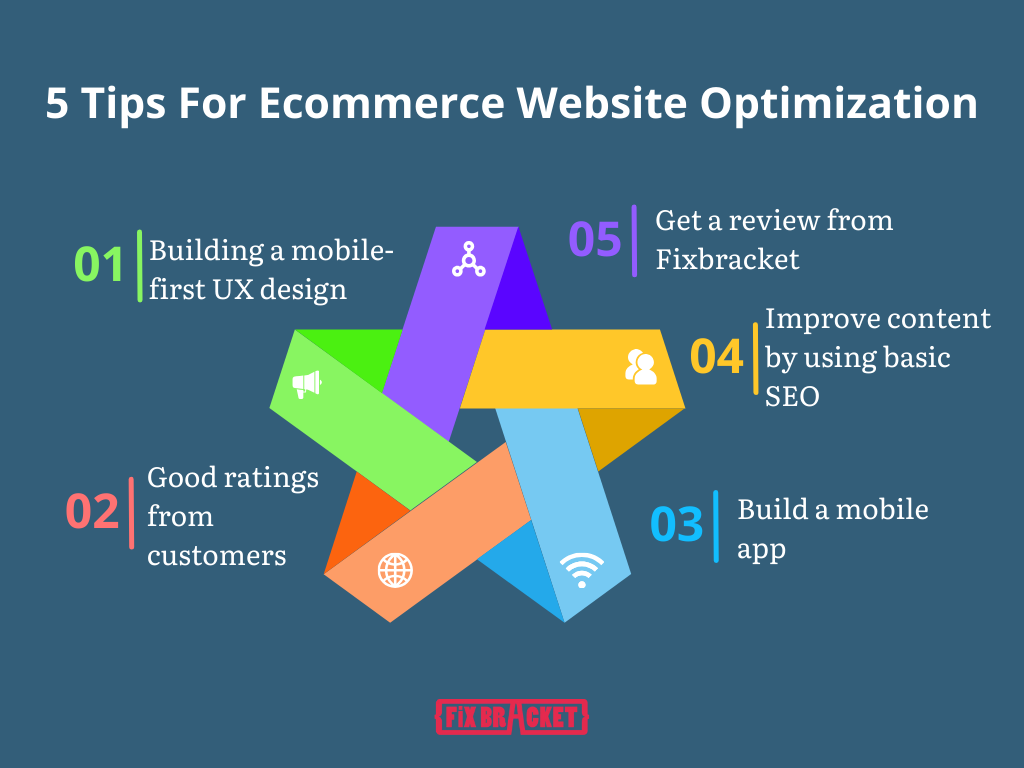Beginner’s Guide To Ecommerce Website Optimization.

In the digital age of 2023, having a visible online presence is no longer just an option; it’s a business imperative. Whether you’re selling a product or offering a service, the key to survival lies in having an ecommerce website optimization.
An ecommerce website isn’t just a virtual storefront; it’s a powerhouse that enhances your company’s customer experience, fostering loyalty among your clientele.
However, let’s be clear — having an ecommerce website optimization strategy goes beyond merely having an Instagram account. In this blog, we’ll delve into practical tips and tricks to optimize your online presence effectively.
But before we jump into the nitty-gritty of improving an E-commerce website, let’s first establish what exactly constitutes an ecommerce website.
What Is An Ecommerce Website?
An ecommerce website, viewed through the lens of SEO, is a digital storefront where businesses showcase and sell their products or services online.
It serves as a virtual marketplace, allowing consumers to browse, select, and purchase items with just a few clicks. From a search engine’s perspective, an ecommerce website is a dynamic entity intricately woven with keywords, meta tags, and structured data, enabling search algorithms to efficiently crawl, index, and rank its pages.
What is Effective Ecommerce Website Optimization?
Effective ecommerce website optimization is the art of fine-tuning this digital marketplace to ensure it not only appears prominently in search engine results but also delivers an exceptional user experience.
It involves a strategic blend of on-page and technical optimizations, aligning content with search intent, and fostering a seamless journey for both users and search engine bots.
In essence, ecommerce website optimization is the key to unlocking online visibility, driving organic traffic, and ultimately, enhancing the digital retail experience.
5 Tips For Improving Ecommerce Website Optimization

1. Building a mobile-first UX design
In today’s tech-savvy era, having a mobile-friendly website is a non-negotiable for any online store.
According to Google’s recent survey, a whopping 56% of e-commerce sellers have already embraced mobile responsiveness. Ensuring a stellar experience for customers accessing your site on mobile devices is paramount. Many businesses are adapting their online stores to align seamlessly with mobile interfaces, recognizing the imperative of catering to the growing legion of mobile users.
Neglecting a smooth mobile experience could be detrimental to your sales objectives and industry standing. Conversely, a well-optimized mobile interface not only elevates your online store’s rankings on Google and other search engines but also ensures that all content—be it video, text, or images—is impeccably presented on mobile devices.
In essence, being mobile-friendly isn’t just a perk; it’s a strategic necessity to outshine competitors in the fiercely competitive landscape.
2. Focus on getting good ratings from happy customers
Looking to boost customer confidence?
Well, here’s a savvy tip: Incorporate product reviews and customer ratings into your strategy!
This tactic is gaining serious traction among online retailers today. Research indicates that authentic product reviews can skyrocket your website’s conversion rate by an impressive 270%.
Why is this so effective?
Because product reviews and customer ratings establish a bond of trust between the customer and your website. When potential buyers see recommendations from past customers, it piques their trust, making them more inclined to make a confident purchase.
All you have to do is politely request feedback based on their purchase experience, whether through star ratings or text. This review then takes center stage on the relevant product page, acting as a powerful motivator to up your conversion game.
3. Mobile Application is a must!
For business proprietors, embracing an official mobile application proves to be a game-changer in the realm of online sales.
Wondering why?
Well, it’s as straightforward as this: people carry their phones everywhere, and a mobile app is far more user-friendly than a website. Take a cue from major players like McDonald’s, MAX Fashion, and more – they’ve harnessed the power of apps to supercharge their ecommerce endeavors. Through these applications, they effortlessly attract organic traffic by rolling out exclusive offers and discounts.
This not only fosters customer loyalty but also elevates the overall customer service experience.
So, it’s time to borrow a strategy from the success stories of these industry giants – consider getting a dedicated app for your e-commerce platform.
4. Content is KING! Improve content quality by implementing basic SEO

Ensure your website’s content is both captivating and professional. Opt for clear, concise text to facilitate easy understanding for visitors, while ensuring not to compromise on crucial information about your product or service.
To boost website visits and product awareness, consider incorporating blogs. This very post you’re reading now serves as an example, drawing in traffic and establishing your website as an informative hub.
Incorporating long-tail keywords is a smart move, as many users lean towards specific terms to filter out irrelevant search results. Utilize long-tail keywords in your content, Meta title, Meta description, and image alt tags for optimal search engine visibility.
Stay one step ahead in the e-commerce race by analyzing your competitor’s content strategy. This strategic move can give you the edge needed to outshine them in the competitive landscape.
Read our guide on Ecommerce SEO to know more!
5. Beat your competitors with Fixbracket
The ecommerce website optimization arena is a battleground, with stores vying fiercely for supremacy. In the relentless pursuit of sales and conversions, every business is striving to outshine the others.
To remain a contender, it’s crucial to stay vigilant and observe your competitors’ strategies for capturing customer loyalty. Take a keen interest in your rivals’ websites, and aim to provide an even more enticing proposition.
Bear in mind that online shoppers are drawn to stores that present irresistible deals.

Value SEO Optimization with Fixbracket
To stay ahead in the game you can get a FREE review of your e-commerce platform on Fixbracket’s blog. We’ll write an in-depth review of your platform and make sure to let the audiences know how you differ from your competition! This is by far, the most direct way to improve your ecommerce website optimization game, as you’ll be gaining multiple backlinks from us on your review.
Please email editor@fixbracket.com to enquire and we’ll get back to you within 48 hours.
Conclusion
Using the tips shared in this blog, your ecommerce website optimization game will skyrocket. We’ve found that ecommerce business owners have many questions when it comes to ecommerce website optimization, which is why we’ve laid down the most pertinent questions that a business owner in ecommerce would have:
Frequently Asked Questions (FAQs)
Q1. What is the estimated cost of constructing an e-commerce website?
The expense associated with building an e-commerce website is variable and hinges on factors like intricacy, functionality, design, and customization. It spans from a modest sum for a fundamental template-based site to a more substantial investment for a fully tailored, feature-rich solution.
Q2. What measures can I take to safeguard the security of my e-commerce website?
Ensuring the security of your e-commerce website involves implementing SSL encryption for safeguarding customer data, opting for a trustworthy and secure hosting provider, regularly updating website software and plugins, employing strong and unique passwords, and establishing a resilient backup and recovery system.
Q3. How can I boost traffic to my e-commerce website?
Various strategies can be employed to enhance traffic to your e-commerce site, encompassing search engine optimization (SEO) tactics, content marketing, social media engagement, email marketing initiatives, paid advertising through platforms like Google Ads or Facebook Ads, leveraging influencer marketing, and enticing customers through discounts or promotions. Crafting a comprehensive marketing plan is crucial for effectively reaching your target audience.
People Also Read:
5 Ecommerce SEO Truths To Boost Sales
Top 5 Ecommerce Platforms For Small Businesses.
Content Marketing Delivers Conversions For Ecommerce Companies.
Shopify vs Amazon: Which Is A Better Ecommerce Platform?




